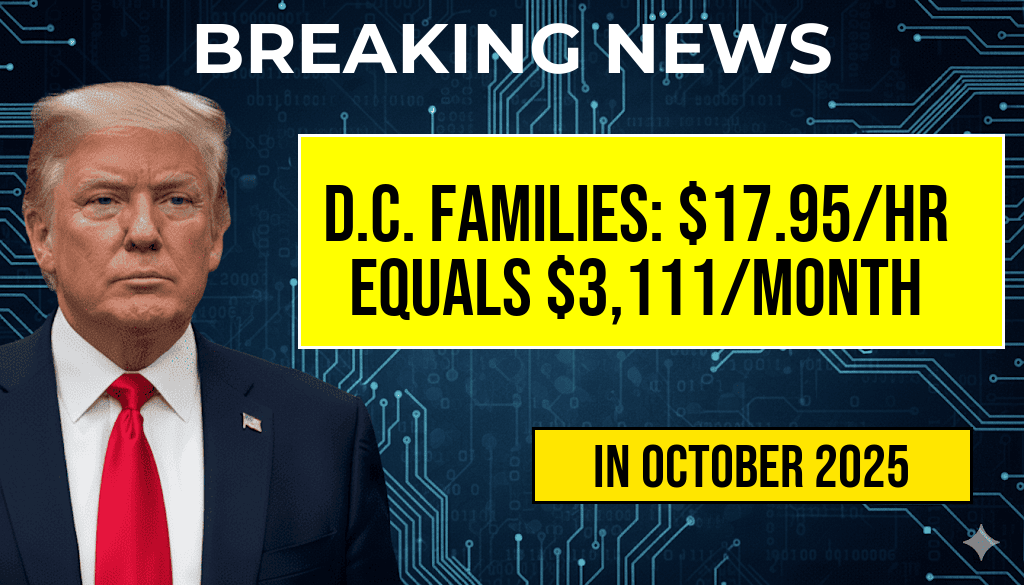For families in Washington, D.C., earning the city’s current minimum wage of $17.95 an hour translates into a monthly pre-tax income of approximately $3,111 for full-time employment. This calculation assumes a standard 40-hour workweek, which aligns with typical employment practices. While this figure may seem substantial on paper, the high cost of living in the nation’s capital—including housing, transportation, and childcare—significantly impacts the purchasing power of such earnings. As policymakers debate living wage standards and affordable housing initiatives, understanding the real income implications of current wage levels becomes critical for residents and city planners alike.
The Mechanics of the Calculation
The monthly income at an hourly rate can be derived by multiplying the hourly wage by the number of hours worked per week, then by the number of weeks in a month. For D.C., with a standard 40-hour workweek, the math is straightforward:
| Component | Details | Amount |
|---|---|---|
| Hourly Wage | $17.95 | |
| Hours per Week | 40 | |
| Weekly Earnings | 40 hrs × $17.95 | $718 |
| Weeks per Month | Average of 4.33 weeks | |
| Monthly Income Before Taxes | Weekly Earnings × 4.33 | $3,111 |
This straightforward calculation illustrates how a modest hourly wage accumulates into a sizable monthly sum before deductions. Nonetheless, the real financial landscape for D.C. families involves numerous expenses that can quickly erode this income.
Cost of Living in Washington, D.C.
The District ranks among the most expensive U.S. cities for residents, with housing costs leading the charge. According to recent housing market data, the median rent for a one-bedroom apartment hovers around $2,000 to $2,500 per month, depending on the neighborhood. This figure accounts for a significant portion of a family’s income at minimum wage, leaving limited funds for other essentials such as transportation, utilities, groceries, and healthcare.
Housing Expenses
- Median rent for a one-bedroom apartment: $2,200
- Average utility costs: $150–$200 per month
- Additional housing-related costs: renter’s insurance, maintenance
Transportation and Other Expenses
- Public transit pass (monthly): approximately $81
- Groceries for a family of four: $800–$1,000
- Childcare costs: often exceeding $1,000 per month per child
These expenses underscore the challenge faced by minimum-wage earners, as their income often falls short of covering basic living costs without additional support or supplemental income sources.
Policy Implications and Debates
In recent years, D.C. has pursued initiatives to raise the minimum wage, aiming to address income disparities and improve living standards. The city’s current minimum wage of $17.95 was implemented as part of a phased increase, with plans to reach $18.87 by 2025. Advocates argue that higher wages are essential to match the escalating cost of living, especially in expensive urban centers like D.C. Conversely, some business groups caution that significant increases could impact employment levels or small business viability.
According to the Wikipedia entry on minimum wages in the United States, many cities across the country are reevaluating their wage policies in response to economic pressures, with some implementing local minimum wages above federal levels. D.C., with its unique economic landscape and federal government influence, remains at the forefront of this ongoing debate.
Living Wage Standards and Future Outlook
Organizations such as the Massachusetts Institute of Technology’s Living Wage Calculator suggest that a family of four in D.C. needs an income of nearly $85,000 annually to cover basic expenses comfortably. This stark contrast highlights the gap between minimum wages and the income necessary for a modest, stable lifestyle. As housing costs, healthcare, and childcare continue to rise, discussions around setting a true living wage are gaining momentum among policymakers and community advocates.
While the current hourly wage provides a foundation, many experts agree that to truly support families, wages must be adjusted to reflect the city’s economic realities. Policymakers are also exploring strategies to expand affordable housing, improve transportation options, and provide targeted assistance programs that can bridge the gap for lower-income residents.
Impacts on Families and Community Well-Being
For D.C. families earning the current minimum wage, economic stability remains elusive. Many workers report working multiple jobs or sacrificing essentials to make ends meet. The persistent affordability crisis influences health outcomes, educational opportunities, and overall community resilience. Addressing these issues requires a multifaceted approach that combines wage policy reforms with broader efforts to make the city more inclusive and sustainable for all residents.
Frequently Asked Questions
What is the hourly wage considered sufficient for full-time families in D.C.?
In D.C., earning $17.95 per hour is considered enough to generate a $3,111 monthly income before taxes for full-time work.
How is the monthly income calculated based on the hourly wage?
The monthly income is calculated by multiplying the hourly wage of $17.95 by the number of work hours in a month for full-time employment, typically around 173 hours, resulting in approximately $3,111 before taxes.
Does this income level meet the cost of living needs for families in D.C.?
Yes, an income of $3,111 per month before taxes is considered sufficient for many families to cover basic living expenses in D.C., though actual needs may vary based on family size and specific circumstances.
What are the implications of earning $17.95 an hour in D.C.?
Earning $17.95 per hour allows full-time workers in D.C. to reach a substantial monthly income, which can help in meeting housing, transportation, and other essential expenses for families.
Is $17.95 an adequate minimum wage for families in D.C.?
While $17.95 an hour provides a solid income for many families, whether it is adequate depends on individual family size and living costs. It is often considered a benchmark for a livable wage in the area.






